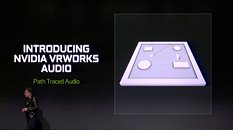Friday, May 6th 2016

NVIDIA Works on Path-traced Audio, VR Works Audio
NVIDIA introduced a path-graced audio technology. Modeled along the lines of ray-tracing, this technology takes into account the 3D scene being rendered, and renders audio in an acoustically-accurate way by mapping the way audio interacts by objects in your 3D scenes, resulting in natural-sounding audio. This is the world's first physics-based acoustics simulation. More on this soon.

11 Comments on NVIDIA Works on Path-traced Audio, VR Works Audio
Another proprietary 3D sound?? Aureal3D, EAX, OpenAL, DirectSound3D, already were killed by Microsoft; this will be next? :)))
Anything like this is proprietary.
But Mantle is dead now, I dont know if Vulcan does anything of the sort.
But regardless, this is 3D positioning tech, I think True Audio was more about the quality of audio in games.